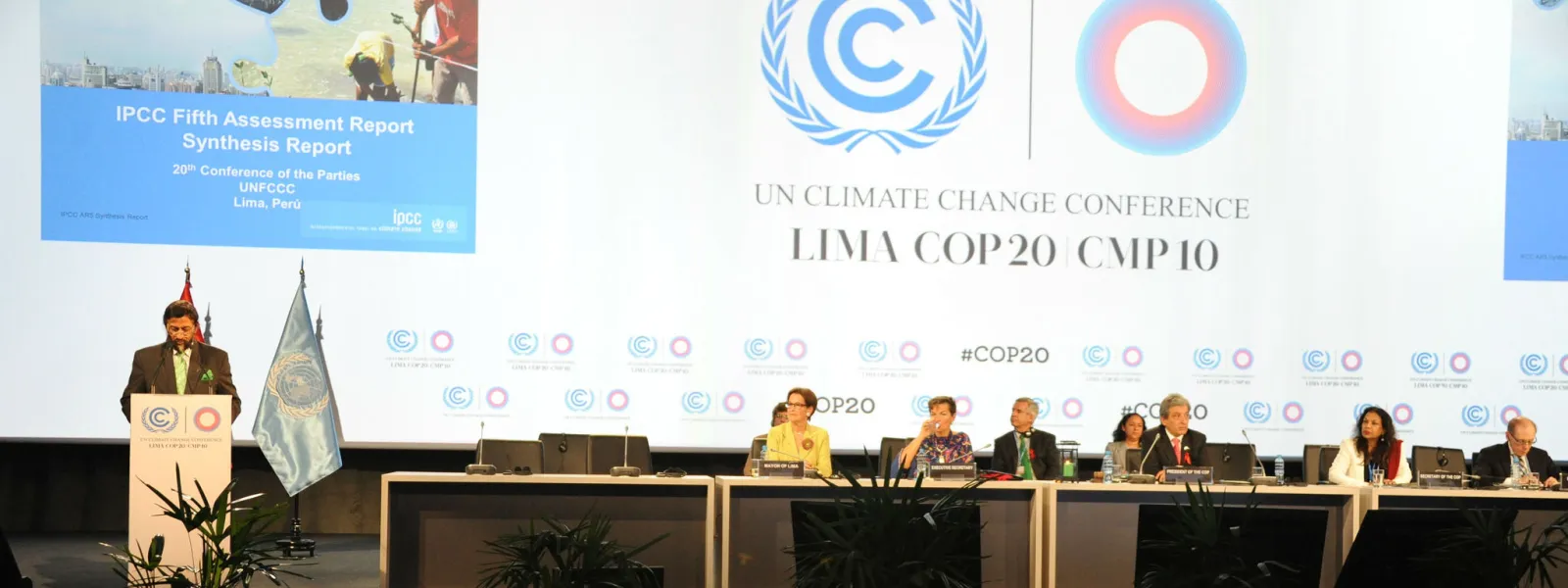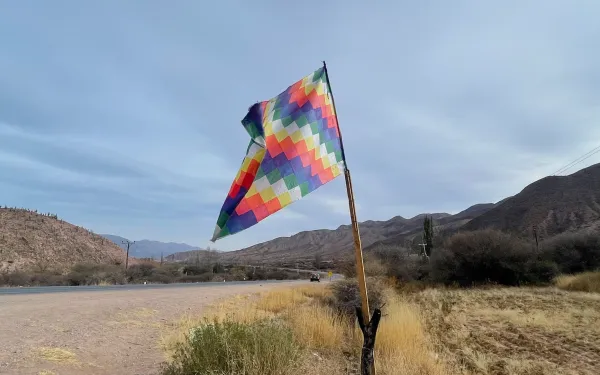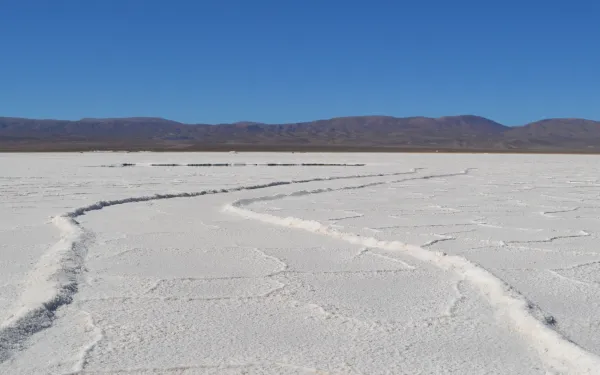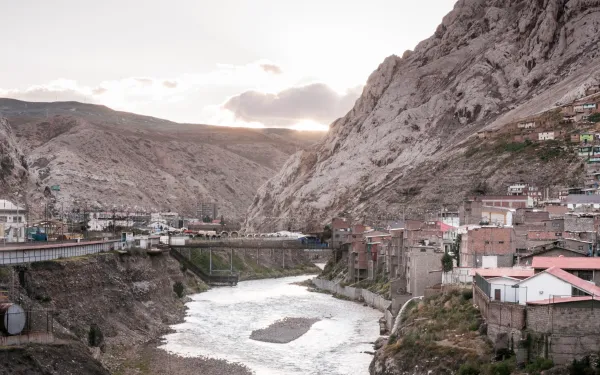
Project
Photo: UNFCCCMonitoring the UN Climate Negotiations
As changes in climate become more extreme, their affects are being hardest felt throughout developing countries. Since 1994, the United Nations Framework Convention on Climate Change has laid out actions to limit the increase of global average temperatures and confront the impacts of climate change.
The States that are Parties to the Convention meet every year in the so-called Conference of the Parties (COP) to review their commitments, the progress made in fulfilling them, and pending challenges in the global fight against the climate crisis.
At COP21 in 2015, they adopted the Paris Agreement, which seeks to strengthen the global response to the climate emergency, establishing a common framework for all countries to work on the basis of their capacities and through the presentation of Nationally Determined Contributions (NDC) that will:
- Limit the increase in global temperatures to 2°C compared to pre-industrial levels and continue efforts to limit it to 1.5°C;
- Increase the capacity of countries to adapt to the impacts of climate change; and
- Ensure that financing responds to the goal of reducing greenhouse gas emissions.
Our focus areas
THE CLIMATE CRISIS AND HUMAN RIGHTS
The climate crisis, due to its transversal character, has repercussions in various fields, geographies, contexts and people. In this regard, the Preamble to the Paris Agreement states that it is the obligation of States to "respect, promote and fulfill their respective obligations on human rights, the right to health, the rights of indigenous peoples, local communities, migrants, children, persons with disabilities and people in vulnerable situations and the right to development, as well as gender equality, the empowerment of women and intergenerational equity."
AIDA at the COP
COP25: Chile-Madrid 2019
At COP25 in Madrid, Spain, we advocated for the inclusion of the human rights perspective in various agenda items. We promoted the incorporation of broad socio-environmental safeguards in the regulation of Article 6 of the Paris Agreement, which refers to carbon markets. We closely followed the adoption of the Gender Action Plan, as well as the Santiago Network, created "to catalyze technical assistance […] in developing countries that are particularly vulnerable to the adverse affects of climate change." We also encouraged the inclusion of ambitious and measurable targets for the reduction of short-lived climate pollutants in the climate commitments of States.
Related projects

Argentina: the scramble for lithium threatens the rights of Indigenous Peoples in Jujuy
International civil society organisations with extensive experience in the defence of the environment and human rights present the conclusions of an observation mission to the Argentinian province of Jujuy in August 2023 following the constitutional reform approved in June of the same year, which facilitates lithium extraction. Paris and San Salvador de Jujuy. In a report published today, ten international civil society organisations with extensive experience in human rights and environmental issues warn that the lack of prior consultation of the 11 Indigenous Peoples of Jujuy in the approval process for the reform of the provincial constitution is incompatible with international human rights and environmental standards.The report also denounces that the new Jujuy Constitution authorises productive activities on public lands, which opens the door to the implementation of extractive projects in Indigenous ancestral territories, without guaranteeing prior, free and informed consultation with the communities. It also approves the large-scale use of water, which facilitates the use of an essential resource for the survival of Indigenous Peoples for the exploitation of lithium, an activity with a high water footprint.The constitutional reform process is framed in a context of mining deployment in the high Andean wetlands of Jujuy, whose watersheds are located in the area known by the mining industry as the "lithium triangle", located on the borders of Argentina, Bolivia and Chile. This area is so named because it is the largest, most easily extractable and economically profitable lithium reserve in the world."We denounce the permanent and disproportionate restriction of the right to social protest introduced by the Jujuy constitution - in particular the general prohibition of road and street blockades, which are not only a legitimate form of peaceful demonstration, but are also protected by international law," the organisations point out.The report also highlights the testimonies of victims of police repression, who suffered arbitrary detentions and serious physical injuries caused by the excessive and unjustified use of force. It also documents the cases of protesters who are currently facing arbitrary and disproportionate criminal proceedings for participating in and promoting public demonstrations against the constitutional reform.In light of the findings presented in the report, the organisations:Request compliance with the international obligations of the Argentinian State to guarantee the protection of the collective property of Indigenous communities over their ancestral territories, as well as to guarantee the right to water intended for human consumption and the reproduction of life.Urge the authorities to refrain from promoting regulations that restrict the ways, places or times in which citizens can exercise their right to demonstrate publicly.Make an urgent call to the judiciary to assess, based on a rigorous examination of international human rights standards, the probable unconstitutionality of the approval process for the reform and its contents. Relationship between the events in Jujuy and the reforms promoted by Javier Milei’s governmentThe analysis offered in the report on what happened in Jujuy is especially relevant in the current national context because President Javier Milei’s national government has followed a similar line to the trend observed in Jujuy of promoting reforms that deepen an extractivist model in protected ecosystems of the country. This occurs while eliminating frameworks for the protection of human and environmental rights and facilitating the repression and criminalisation of legitimate protests, as detailed in the report.Through Decree of Necessity and Urgency No. 70/2023, President Milei repealed the Land Law (26.737) on 20th December 2023, eliminating restrictions aimed at preventing land grabbing by foreign investment projects. In addition, the "omnibus" bill proposes to repeal environmental protection laws to facilitate economic activities in ecosystems such as native forests and glaciers.These measures, similar to those implemented in Jujuy, were accompanied by disproportionate restrictions on the exercise of the right to protest. For example, on 14th December 2023, the executive approved the "protocol of anti-picketing action", which considers any demonstration that interrupts or decreases the movement of people a flagrant offence, requiring police intervention. Read the report
Read more
Lithium Fever: Indigenous Peoples’ Rights Under Attack in Jujuy, Argentina
International Fact-finding Mission Report (21-25 August 2023) Jujuy is one of the 23 autonomous provinces making up the federal state of the Argentine Republic. It is located in the north west of the country, bordering the Plurinational State of Bolivia and the Republic of Chile. According to the official census, it is one of the provinces with the highest percentage of indigenous population in the country.On 20 June 2023, the Jujuy Province approved the modification of 193 of the 212 articles of its Provincial Constitution,1 through a Constitutional Convention that was in session for less than a month.The constitutional reform was the subject of numerous and prolonged citizen protests. During and after its approval, different social sectors in Jujuy criticised the lack of citizen participation and the exclusion of indigenous peoples’ voices in the constitutional process. They also denounced provisions in the new Constitution, which severely restrict the right to protest and undermine the rights of indigenous peoples over their ancestral territories and water sources.Eight international civil society organisations with extensive experience in human rights and environmental rights carried out an international fact-finding mission to Jujuy from 21 to 25 August 2023. Members of the International Federation for Human Rights (FIDH),2 the Interamerican Association for Environmental Defense (AIDA), Brot für die Welt/Bread for the World, the Economic, Social and Cultural Rights Project (ProDESC), the Human Rights Law Centre (HRLC), the Centre for the Study of Law, Justice and Society (Dejusticia), Movement Law Lab (MLL) and the Global Network of Movement Lawyers (GNML) participated in this initiative.The objective of the international fact-finding mission was to document, through fieldwork and access to direct sources, potential violations of human and environmental rights that occurred in the context of the constitutional reform, including the repression and criminalisation of people who participated in and promoted protests against it. To this end, the mission interviewed civil society actors, representatives of indigenous peoples and provincial and national authorities. Meetings took place both in San Salvador de Jujuy, the provincial capital, and in rural communities located in the towns of La Quiaca, Salinas Grandes, Susques, Humahuaca, San Roque and Purmamarca.The international fact-finding mission acknowledges that the Provincial Government of Jujuy, as well as the National Government of the Argentine Republic, offered the necessary guarantees for the visit to take place and provided information on the human rights context, respecting the right to defend human rights. It is also grateful for the trust of the representatives and members of indigenous and rural communities and human rights and environmental defenders, who shared their testimonies with the mission. To all of them, we express our recognition and solidarity with their struggle for human rights.This report contains the main findings of the international mission, based on the field visit, the review of primary and secondary documentary sources and the processing of the information gathered during and after the visit to Jujuy, through interviews with more than one hundred people. Read and download the report
Read more
Community of La Oroya wins landmark ruling to stop environmental damage in Latin America
After more than 20 years, the residents of the town of La Oroya in the Peruvian Andes have found justice, opening a major new avenue for protecting a healthy environment throughout the continent. In an unprecedented decision, the Inter-American Court of Human Rights found Peru guilty of violating their human rights by failing to act in a timely and effective manner to protect them from extreme levels of pollution from a metallurgical complex that has operated in their community for nearly 90 years. "Twenty years ago, when this struggle began, I carried my banner saying that children's health is worth more than gold," recalls Don Pablo, a resident of La Oroya. "We never gave up, and now I am very happy with the Court's decision.” La Oroya is located in the central mountain range of Peru, in the department of Junín, approximately 176 km from Lima. In 1992, the US company Cerro de Pasco Cooper Corporation installed the La Oroya Metallurgical Complex to process ore concentrates. The complex was nationalized in 1974 and operated by the state until 1997, when it was taken over by Doe Run Peru, which operated it until 2009. For generations, the inhabitants of La Oroya have inhaled toxic substances that pose serious risks to human health. Heavy metal contamination has invaded their respiratory system, traveled through their bloodstream, and been imperceptibly deposited in several of their vital organs. Most of those affected had lead levels above those recommended by the World Health Organization, and in some cases higher levels of arsenic and cadmium, in addition to stress, anxiety, skin disorders, stomach problems, chronic headaches, and respiratory or cardiac problems. In 1997, AIDA became involved in defending the rights of the La Oroya community. Our publication La Oroya No Espera (La Oroya Cannot Wait), published in 2002, helped bring the gravity of the situation to international attention. In 2006, in the absence of effective responses in Peru, we joined an international coalition of organizations in filing a complaint against Peru before the Inter-American Commission on Human Rights. In 2021, the Commission established the responsibility of the Peruvian government in the case and referred it to the Inter-American Court. In October 2022, more than 16 years after the complaint was filed, the victims presented the case to the Court in a public hearing, represented by AIDA and the Asociación Pro Derechos Humanos (APRODEH), with the support of Earthjustice. Since 2009, when the metallurgical complex ceased operations due to Doe Run Peru's financial crisis, the levels of heavy metal contamination have not been reduced to acceptable levels. Nor has the situation of those affected improved significantly in recent years. Although the Peruvian government has known since 2009 that all children living near the complex are suffering from lead poisoning, it has not provided them with adequate medical care. But there is no deadline that will not be met. On March 22, the Inter-American Court of Human Rights gave a powerful response to more than two decades of seeking justice. The Court found that Peru was guilty of violating the rights to a healthy environment, health, personal integrity, life with dignity, access to information, political participation, judicial guarantees, and judicial protection of the 80 people involved in the case; of violating the rights of the children of 57 victims; and of violating the right to life of two others. "This is the first judgment that recognizes the international responsibility of a state for violating the right to a healthy environment and other related rights," says Rosa Peña, AIDA Senior Attorney. Ver esta publicación en Instagram In addition, the Court ordered the State to adopt measures of integral reparation for the damage caused to the people of La Oroya. These include the prosecution and punishment of those who harassed the residents for their environmental defense work; the preparation of a remediation plan for air, soil, and water contamination; the provision of free and specialized medical care to the victims, as well as to other residents with symptoms and illnesses related to mining and metallurgical activities; the updating of air quality regulations to ensure the protection of the environment and human health; the provision of monetary compensation to the victims; and the creation of an air, water, and soil quality monitoring system. It also ordered that the operations of the La Oroya Metallurgical Complex—which was transferred to the workers of Doe Run Peru as part of the company's liquidation—comply with international environmental standards and prevent and mitigate damage to the environment and human health. The Court's decision is not only a unique opportunity to restore the dignity and rights of the people of La Oroya. Its scope extends beyond the Peruvian context, making it an important precedent in Latin America for the protection of the right to a healthy environment and for adequate state oversight of corporate activities. Among other things, the Court established the obligations of states to regulate, monitor and control air and water quality, to identify sources of pollution, and to implement plans to enforce air and water quality standards. The Court held that in order to establish state liability for environmental damage, it is sufficient to show that the state, despite being aware of the existence of high levels of pollution, failed to take adequate measures and thus allowed the pollution to continue, thereby posing a significant risk to human health. In light of the judgment, states must prevent human rights abuses by public and private enterprises. Businesses, for their part, must prevent their activities from causing or contributing to human rights abuses and take steps to remedy such abuses. Defending the right to a healthy environment has been part of AIDA's history since our inception and has always been a collective effort. We celebrate and recognize all the people who, from different sectors, roles and capacities, made possible the historic result of the La Oroya case. With renewed vigor, we will work for the proper implementation of the judgment and for the establishment of new important precedents that will guarantee in practice the universal right to a healthy environment in the region.
Read more